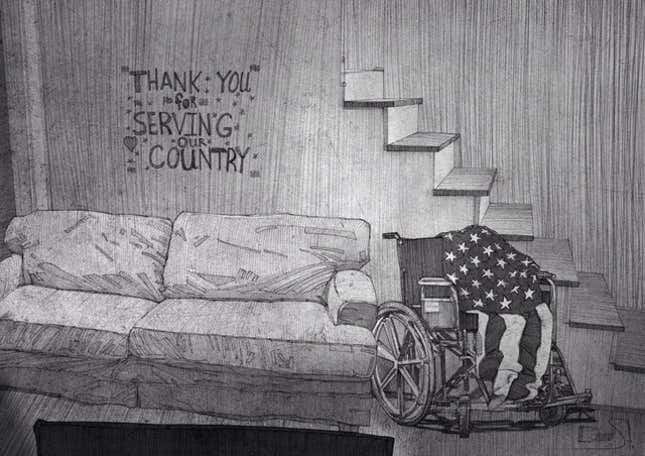
This entry is part of a series called Craigslist Confessional. Writer Helena Bala has been meeting people via Craigslist and documenting their stories for nearly two years. Each story is written as it was told to her. Bala says that by listening to their stories, she hopes to bear witness to her subjects’ lives, providing them with an outlet, a judgment-free ear, and a sense of catharsis. By sharing them, she hopes to facilitate acceptance and understanding of issues that are seldom publicly discussed, at the risk of fear, stigma, and ostracism. Read more here. Names and locations have been changed to protect her subjects’ anonymity.
Aaron, 50s
I opened my left eye first; my right one held out, permanently rooted down and refusing to see the astringent room. As soon as my body awoke, I felt a sharp pain and braced as it spread through me like a sea of fire. It slowly started dawning on me—where I was, and why—but before I could think, I pumped my PCA and felt my body relax back into the bed. The white sheets enveloped me and I drifted back to sleep.
I couldn’t have been out for longer than a few hours when I heard muzzled voices over the distinctive sound of the wound vac. They had come around to clean out what was left of my right leg, and I kept my eyes shut even though I was wide awake and in full panic. The stench of burning flesh traveled up to my nose and I was instinctively ashamed that my body had produced such a rot. In the past week, I’d been on Vicodin, Morphine, and Dilaudid, but no cocktail of narcotics took away the dull ache that I felt on both of my legs. I wasn’t sure anymore if I was imagining it, or if it had always felt like that. I pumped my PCA again.
When I did the balance exercises during physical therapy, there’d be moments that I’d forget what had happened. I’d feel my fleshy feet hit the ground as they always did, when I was young, when I played sports, when I was normal and whole, before the war. But when I looked down, I saw the metal contraptions that had replaced much of my legs and I chuckled to myself. The brain could play cruel tricks.
I was alone a lot, but not really. I was in the VA, surrounded by people who had been through war, just like me, but we were all in our own little worlds. People looked intently at the nothingness in front of their eyes, their brain probably projecting some horror that only they had seen. They jumped and screamed and woke up in the middle of the night sweating and crying for their mothers. They were children again.
After almost two years, they let me go home. My wife awkwardly helped me into the back of the van, and I thought I smelled booze on her. She had changed while I was gone—her eyes seemed deeper sunk into their sockets, her hands seemed colder, and she went rigid every time I touched her. I knew she was drinking again, and I knew she was seeing other men.
The drive home was excruciating—I sweat through my shirt and dug my nails into the palms of my hands until they both bled. Every slight honk, every sudden stop, every churn of the engine would bring me back to that day, that exact moment, when our vehicle was blown feet into the air—and then minutes afterwards, when I awoke, and my brothers didn’t.
I tried shutting it out—tried telling myself that I wasn’t there anymore, that I was safe, and that I was finally home. But home was so different than how I had imagined it when I was away. I’d imagined warm yellows and soft pinks, I’d imagined the sunlight seeping through our kitchen blinds, I’d imagined my kids and my wife—their voices ricocheting sweetly through the house like a wind chime.
But everything was grey. When I shut my eyes, I couldn’t stop the landscape of the barren desert from projecting itself inside my head and into my mind’s eye. I couldn’t stop the ringing in my ears. I couldn’t stop the images in my head from popping up over and over again, like a broken video game.
“Well, I’ve settled your stuff in the basement,” she said when we got home. I knew that she wanted me out of the way, that the simple sight of me disturbed her, disgusted her, and frightened her. I was the fly in her ointment.
“You’ll have some stairs to climb in the morning but that oughta help you with your exercises,” she said over her shoulder as she reached into the freezer for the handle of vodka.
I made my way down the stairs wordlessly and collapsed onto the gray couch, surveying the room. The remnants of my years of service were all crumpled up in the corner of the room next to a portable fridge—and they looked so insignificant, so unimpressive. I had this weird feeling of loss, like I was mourning someone. Except I didn’t know who.
It snuck up on me—that feeling of not being whole anymore, of being less than a man. This homecoming was heartbreaking, and I wondered if I’d have been better off dead. That tiny basement room closed in on me then. I looked down at my legs and cried for the first time.




